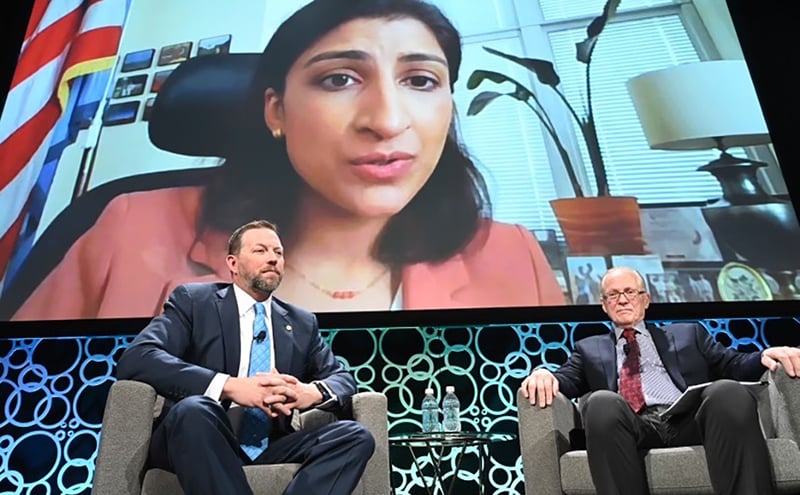During a packed and engaged closing keynote session on Wednesday, FTC Chair Lina M. Khan and health care business researcher Lawton R. Burns, PhD, MBA, spoke frankly about the damaging effects of consolidation in health care and fielded questions from the audience about private equity, non-competes, and unchecked monopolies.
Called to be at the White House at the last minute, Ms. Khan joined the session remotely and gave opening remarks about the FTC’s renewed focus on promoting fair competition in labor markets and health care markets. As she spoke about the FTC’s proposed ban on non-competes, the individual stories ACEP collected from its members displayed on the large screens in the auditorium.
“It’s really easy for folks in D.C. to kind of have blind spots and kind of lose touch with the realities of how people in their everyday lives are experiencing monopoly power,” Ms. Khan admitted. “We always want to be hearing from you all, understanding how an antitrust and consumer protection could be applied in health care to make these markets work better for everybody. Your patients and your communities deserve the type of committed knowledgeable care that you've dedicated your lives to providing, and you all deserve the economic freedom and the liberty that the antitrust laws are designed to protect.”
Dr. Burns, a professor at the Wharton School of the University of Pennsylvania, has been studying vertical integration since the late 1980s, with special focus on health care. “All the incentives right now for just about every player in the health care system is to merge and get bigger—not necessarily to improve the quality of care that they provide, not necessarily to reduce the cost of care or improve the efficiency of what they provide, but just to get bigger, out-muscle their competitors and charge higher prices.”
Dr. Burns said consolidation started in the late 1960s, and 55 years later, that kind of behavior is now “baked into the system” and hard to eradicate.
“We see this everywhere in the health care system,” he said, emphasizing that we all want relief from the consolidation trend. “Consolidation is like a runaway train, and we're looking for ways to put on the brakes.”
Both speakers went into detail explaining the different models of consolidation and how they have to be addressed separately because of their unique aspects. Dr. Burns talked specifically about insurance companies who employ physicians. "The obvious example there is Optum, which now has up to 70,000 owned or contracted physicians."
Horizontal and vertical consolidation is happening across other industries as well, but Ms. Khan emphasized that the FTC is especially focused on health care, looking closely at its negative effects on clinicians and patients.
“Health care is not like buying a toaster or a vacuum cleaner,” Ms. Khan said. “This is life and death oftentimes, so these are some of our most important markets.”
Dr. Burns said that hospital CEOs and system CEOs have a clear rationale for their consolidation strategies—“to grow, and grow their revenues, but that doesn’t necessarily benefit the public, and it doesn't necessarily benefit the communities that they serve.”
Having closely studied the medical industry for decades, Dr. Burns said that our health care system is anything but systematic. “A system suggests something that's organized and functions well, where everybody's got their division of labor and they work together. We don't have that,” he said. “We have basically a health care ecosystem… basically, a jungle. You have all these different parties contending with one another. It's dog eat dog. There are no partnerships, there is no collaboration. Everybody's out to further their own ends.”
Dr. Burns said within health care, we have a collection of entities competing against each other. “Don't expect [health care] to act in an organized, coherent way because it isn't organized, and it isn't coherent.”
The closing keynote session was interactive, providing approximately 20 minutes for attendees to ask questions of Dr. Burns and Ms. Khan. When asked what can be done to push back on private equity, Ms. Khan said the FTC wants to change its processes to be made aware of private equity acquisitions that may fall under the $100 million threshold that flags them for FTC review.
“We just put forward what’s called our ‘revised HSR form’… It basically means when companies are merging – or are looking to merge and have to report it to us—that we're going to increasingly require them to list their history of acquisition,” she explained. “So, we’ll have more understanding—is this a serial acquire? Is this a private equity firm that's looking to roll up a market in ways that may harm competition? And then we can act on the front end rather than years later, when the harm's already been done.”
The closing session started and ended with the value of your personal stories as an advocacy tool as ACEP and the FTC continue to work together to address harmful consolidation in emergency medicine.
“It's just difficult to overstate how valuable your stories, your experiences, are for us,” Ms. Khan said. “We've just benefited so much from hearing from your comments on our proposed merger guidelines and your comments on our proposed proposal to ban non-competes. Your voices are just essential for us.”





